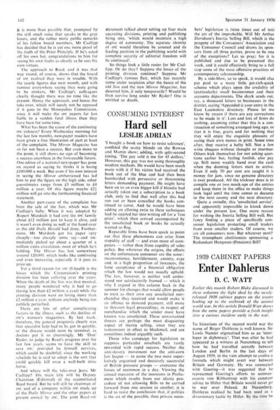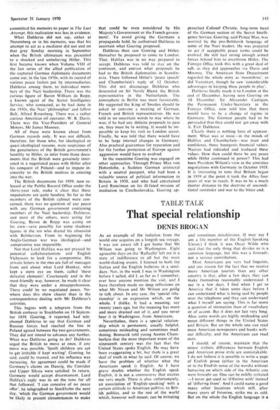1939 CABINET PAPERS
Enter Dahlerus
D. C. WATT
Earlier this month Robert Blake discussed in these columns the light shed by the newly- released 1939 cabinet papers on the events leading up to the outbreak of the second world war. In this article Donald Watt shows how the same papers provide a fresh insight into a curious incident early in the war.
To historians of the second world war the name of Birger Dahlerus is well known. Sir Lewis Namier stigmatised him as an 'inter- loper in diplomacy'. That was after he had appeared as a witness at Nuremberg to tell how he had travelled secretly between London and Berlin in the last days of August 1939, in the vain attempt to evolve a formula which might avert war between Britain and Germany. He was connected with Goering—it was suggested that he represented Goering's efforts to outman- oeuvre von Ribbentrop with his constant advice to Hitler that Britain would never go to war over Poland. At Nuremberg. Dahlerus realised he had been used as a diversionary tactic by Hitler. By the time he committed his memoirs-to paper in The Last Attempt, this realisation was less in evidence.
What Dahlerus did not say, either at Nuremberg or in his memoirs, was that his attempt to act as a mediator did not end on that grey Sunday morning in September when the British ultimatum was presented to a shocked and unbelieving Hitler. This first became known when Volume VIII of the last series of the allied publication of the captured German diplomatic documents came out, in the late 1950s, with its record of various peace feelers put by intermediaries, Dahlerus among them, to individual mem- bers of the Nazi leadership. There was the curious figure of Baron William de Ropp, a known agent of the Secret Intelligence Service, who contacted, as he had done in the 1930s, the Nazi 'philosopher' and fellow Balt, Alfred Rosenberg. There was a rather curious American oil operator, W. R. Davis. There was the Vice-President of General Motors. Mr James Mooney.
All of these were known about from German records only. it was not difficult, therefore. for those who, for ideological or quasi-ideological reasons, were suspicious of the genuineness of the British government's hostility to Hitler, to infer from those docu- ments that the British were genuinely inter- ested in a negotiated peace with Hitler after his conquest of Poland—and to impute in- sincerity to the British motives in entering into the war.
The British documents for 1939, now re- leased at the Public Record Office under the thirty-year rule, make it clear that these imputations are quite baseless. So far as the members of the British cabinet were con- cerned, there was no question of any peace with any German government containing members of the Nazi leadership. Dahlerus, and most of the others, were acting for Goering, Baron de Ropp was acting on his own—save possibly for some shadowy figures in the sts who shared his obsession with Bolshevism. From its beginning the Anglo-German war was ideological—and compromise was impossible.
Not that Lord Halifax was not pressed by potential collaborationists and English Vichyssois to look for a compromise. His private letters in the PRO are full of messages from and about what Lord Hankey, who kept a stern eye on them, called 'these defeatist elements'. Courteously and in the most friendly way, however, he made it clear that they were under a misapprehension. There could be no negotiated peace. No- where does this show clearer than in the correspondence dealing with Mr Dahlerus's activities.
This begins with a telegram from the British embassy in Stockholm on 18 Septem- ber 1939. Goering, it reported, had tele- phoned Dahlerus to say that German and Russian forces had reached the line in Poland agreed between the two governments. They did not intend to advance any further. What was Dahlerus going to do? Dahlerus urged the British to move at once, if any move was possible. 'Spoilt children are apt to get irritable if kept waiting'. Goering, he said, could be trusted, and his influence was increasing. An agreement could be made if Germany's claims on Danzig, the Corridor and Upper Silesia were satisfied. In return, Germany would accept disarmament. Lord Halifax's reply was to set the tone for all that followed. 'I can conceive of no peace offer', he telegraphed to Stockholm the next day, 'which the German government would be likely in present circumstances to make that could be even considered by His Majesty's Government or the French govern- ment'. To avoid giving the Germans a propaganda hold, he authorised Dahlerus to ascertain what Goering proposed.
Dahlerus then saw Goering and Hitler; thereafter he proposed to come to London. That, Halifax was in no way prepared to accept. Dahlerus was told to stay on the continent, and entrust what proposals he had to the British diplomatists in Scandin- avia. There followed Hitler's 'peace speech' and Chamberlain's reply of 12 October. This did nct discourage Dahlerus who descended on Sir Nevile Bland, the British representative in the Netherlands. The atmosphere in Berlin was most favourable. He suggested the King of Sweden should be asked to convene a meeting of German, French and British representatives. He was told in no uncertain words to stay where he was; if he had any definite proposals to pass on, they must be in writing. It would be im- possible to keep his visit to London secret. Finally, he was told that there would have to be large internal changes in Germany. Also practical guarantees for reparation and for the further protection of Europe against aggression would have to evolved.
In the meantime Goering was engaged on other approaches. Through Prince Max von Hohenlohe, a Sudeten German aristocrat with a neutral passport, who had been a valuable source of political information to Britain in 1938, and who had entertained Lord Runciman on his ill-fated mission of mediation to Czechoslovakia, Goering ap- proached Colonel Christie. long-term head of the German section of the Secret Intelli- gence Service. Goering, said Prince Max, was worried by the pro-Bolshevik language of some of the Nazi leaders. He was prepared to act if acceptable peace terms could be evolved. He still had strong enough armed forces behind him to overthrow Hitler. The Foreign Office took this with.a great deal of salt, as they did approaches via Davis and Mooney. The American State Department regarded the whole story as 'moonshine', as did Vansittart, though he saw 'considerable advantages in keeping these people in play'.
Dahlerus finally made it to London at the end of December, having seen Goering on 18 December. Sir Alexander Cadogan, the Permanent Under-Secretary in the Foreign Office, now told him that there would have to be a change of regime in Germany. The German people had to be persuaded that they could not get away with it. Exit Dahlerus.
Clearly there is nothing here of appease- ment. What was at issue—in the minds of Halifax and Chamberlain—was trust and confidence, those bourgeois financial values. Nazism had ridiculed and traduced these values. How then could there be any peace while Hitler continued in power? This had been President Wilson's view in the armistice negotiations with Germany in October 1918. It is interesting to note that Britain began in 1939 at the point it took the Allies four years of war to reach. It was to be a much shorter distance to the doctrine of uncondi- tional surrender and war to the bitter end.



































 Previous page
Previous page